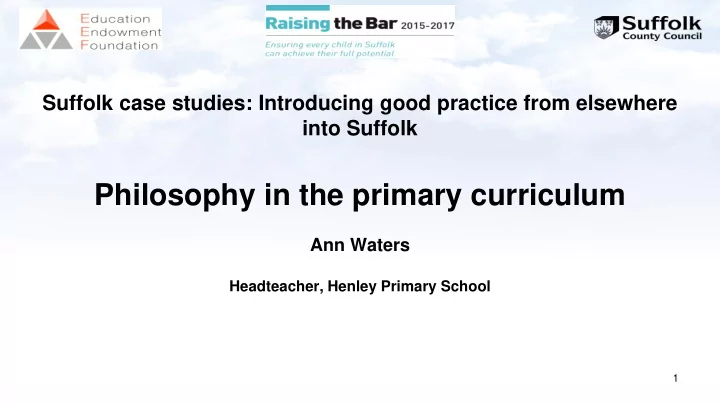

Suffolk case studies: Introducing good practice from elsewhere into Suffolk Philosophy in the primary curriculum Ann Waters Headteacher, Henley Primary School 1
Why Philosophy?
Why Learn Philosophy? Philosophy helps children to learn about how they think. It gives children the tools to ask productive questions. It encourages children to be effective listeners. It enables children to work with others collectively to improve ideas. It allows all children to have a voice and be heard. It facilitates the art of discussion and debate. It prompts self-reflection and develops reasoning. It challenges commonly held assumptions. It permits the discussion of difficult and sometimes controversial topics. It follows an ancient tradition of exploring ideas and challenging the status quo. It translates well across all areas of the curriculum. It provides an excellent basis for the study skills needed in in higher and further education.
Philosophy for Children Skills Objectives by Year Group Year Group Concepts Listening well R Giving examples Giving reasons Asking questions 1 Making statements Building on others’ ideas Summarising Reflection Grouping questions 2 Open and closed questions Seeking and giving clarification Making connections in discussions Explanations
Year Group Concepts Exploring different points of view 3 Different types of questions Listing criteria Metaphors Counter examples Definitions Alternative possibilities 4 Analogies Distinctions Similarities and differences Challenging assumptions 5 Identifying faulty reasoning Testing analogies Relevance Making hypotheses 6 Evaluating the progress of discussion Making inferences Testing plausibility of evidence
Giving and Seeking Reasons • Pupils should: • Consider why they believe something and whether they can justify their view. • Think about the strength of their reasoning, supporting their view. • Consider their ideas before sharing them – self-questioning skill.
Exploring Disagreement • Disagreement is fundamental to the community of inquiry. • However, it must be done respectfully and courteously. • It is the validity of the idea that is under question, not the validity of the person.
Building on Ideas Sylvie’s Idea Lucy’s Idea Kit’s Idea Sarah’s Idea • It is only by considering and using the ideas of others that a discussion will move forward and the sense of ‘we’re all in this together’ will develop. • It is attention to this aspect of the discussion that is central to establishing intellectual co-operation.
Questioning Assumptions • Pupils are often very quick to make assumptions. • They seem to think that everyone has a shared understanding of ideas, concepts and beliefs or that everyone has come to the same conclusion given the same information as them. • They need to be stopped in their tracks!
Issues to Consider • The impact philosophy will have on learning, self-confidence, articulation of ideas, independence and team work. • The impact on the behaviour for learning and behaviour in general across the school. • The insight you may gain into the ideas of your pupils at any ability level.. • The impact on staff of pupils who question assumptions and want to think for themselves (both in a good way and in a challenging way). • There must be a whole school time commitment to a ‘Philosophy’ lesson each week. • Go and see philosophy taught well in primary schools – local schools, Handford Hall, Castle Hill Infants, Henley… • Staff will need the opportunity to explore the concept and pursue appropriate training.
Recommend
More recommend